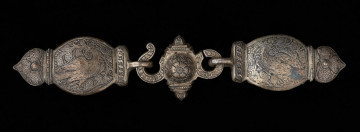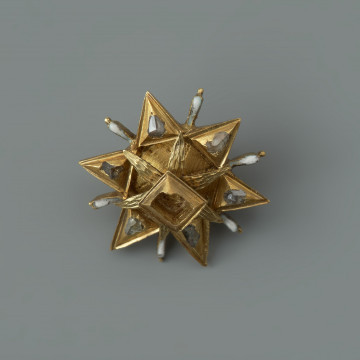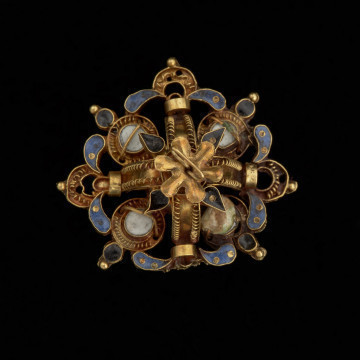
Three-piece pendent buckle of Duke Casimir VI/IX (1557-1605)
około 1600
National Museum in Szczecin
Part of the collection: Jewels and costumes of Pomeranian dukes
In the set of belt and baldric fittings, excavated from the sarcophagus of Pomeranian Duke Barnim X (XII) (1549-1603) or his brother Casimir VII (IX) (1557-1605), apart from a three-part buckle, loops, belt end fittings and a baldric buckle, there are also hooks of various sizes. The largest ones with a transverse lug at the bottom were used to fasten the baldric, i.e., a belt attached to the rapier scabbard. A parade weapon worn at the side was an indispensable element of the representative attire of princes and noblemen. In the Renaissance period, it was usually a rapier, i.e. a weapon with a long, straight, double-edged wedge. No examples of the Pomeranian dukes' parade weapons have survived to our times. In the sarcophagus of the House of Griffin in the crypt under the Castle Church in Szczecin, only heavily corroded fragments were found, which do not reflect the original splendour of rapiers and flints with gilded handles. The most important source of information on the appearance of the white arms used on parades at the court of the House of Griffin is the dukes' portraits. The rapiers depicted in the paintings of the 17th century have handles richly decorated with patterns made in the niello technique or with relief decoration. The rapier scabbards hanging at the waist were also decorative. In the crypt of the House of Griffin, we found a fitting of the lower part of rapier or dagger scabbard (the so-called throat), gilded originally, decorated with a figure of a man placed in a niche, probably an ancient hero, as well as a putto's head and Renaissance scroll ornament.
Monika Frankowska-Makała
Author / creator
Dimensions
cały obiekt: height: 2,6 cm, width: 15 cm
Object type
adornment, belt
Creation time / dating
Creation / finding place
Identification number
Location / status

około 1600
National Museum in Szczecin

nie po 1637
National Museum in Szczecin

nie po 1637
National Museum in Szczecin
DISCOVER this TOPIC
National Museum in Szczecin
DISCOVER this PATH
Educational path